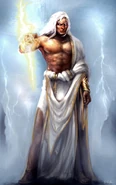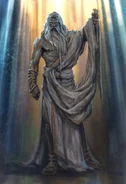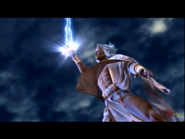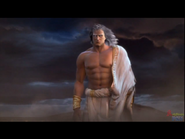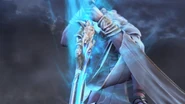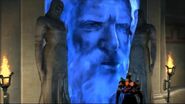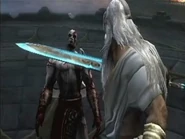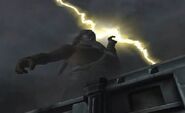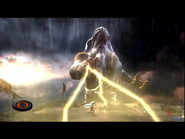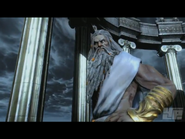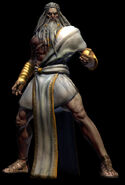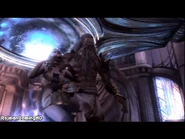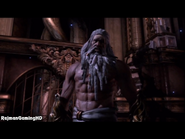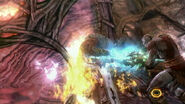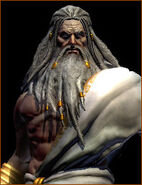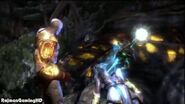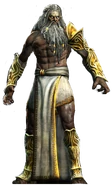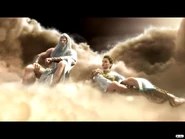| “ | We have faced far worse than this one fallen mortal. But we are the gods! We whom the mortals worship. We who rule over this land. We who will not be swept aside by this petulant fool! Brothers, put aside the petty grievances that have splintered us for so long. We will unite. We will stand together. And I will wipe out this plague! Olympus..will prevail! | ” |
–Zeus to his fellow gods, Poseidon, Hades, Helios and Hermes. | ||
Template:Infobox gods
Zeus (Greek: Ζεύς) was the Emperor and the youngest of the Gods, ruler of Olympus and was the God of Kings, Thunder, Mortals, Lightning, and the Heavens. He acted as an ally in God of War and also served as the main antagonist of both God of War II and God of War III, and was the biological father of more of the gods of Olympus and many famous demigods such as Hercules, Perseus, Peirithous and even the Spartan warrior Kratos as well as his brother Deimos.
Greek Mythology
In Greek Mythology, Zeus was the Emperor of the Gods, ruler of Olympus, and God of the Air, Sky, Heaven, and Lightning. Zeus was youngest of his siblings. His symbols were the Lightning bolt, the Eagle, the Oak Tree and the Bull. Zeus was the youngest son of Cronos and Rhea. He was very well known for his erotic escapades with beautiful mortal women, resulting in many godly and heroic offspring, including Athena, Apollo, Artemis, Hermes, Persephone, Dionysus, Perseus, Hercules, Helen and Minos. When the loss of his older siblings by their father Cronos became too great for Rhea to bare any longer, she hid him from Cronos far away, giving him a stone to swallow instead. Once grown, the young God sought to free his siblings and overthrow his father. Disguised as a cup-bearer, Zeus mixed a brew into Cronos' wine, causing him to vomit up the stone that had taken his place, and then his siblings. Overthrowing the Titans, Zeus castrated Cronos and banished him to Tartarus. Later drawing lots with his brothers Poseidon and Hades to determine who would rule the skies, oceans, and the Underworld, Zeus won the sky, and became the King of Olympus.
Some sources claim that Zeus is technically the eldest, due to being the only child to not be kept from the world and trapped in their father's stomach, though this is disputable, and some claim fabricated by Zeus himself to lend validity to his claim to the sky before he and his brothers decided to draw lots.
His counterpart in Roman Mythology is Jupiter.
In the God of War Series
During the reign of the Titans, Cronos was told of a prophecy that said he was destined to be overthrown by his children. To prevent this fate, the mighty Titan swallowed his children, one by one. By the moment Zeus was born, Rhea devised a trick to save him by letting an eagle carry the baby Zeus to safety, while he was replaced by a stone wrapped in cloth which Cronos devoured and mistaken it as his child. The eagle then carried the infant Zeus to the Mother Earth Gaia so that he would be raised and blessed with the strength to stand up against his father. During this time, Zeus developed a deep hatred for his father, and looked forward to the day where he would finally release his siblings, according to a drawing inside Gaia, Zeus was planning on a method to release his brothers and sisters ever since he was very young, as the drawing portrays him opening Cronos's belly and setting them free.

Zeus during The Great War
After coming of age Zeus decided to put his plans of freeing his brothers and sisters into action. Zeus freed his siblings and declared war on the Titans, consumed with feelings of revenge. Betraying Gaia, the very Primordial who had raised him, he waged war on all the Titans for the sins of only one. The new rulers of the world, the Gods, calling themselves Olympians, fought against their predecessors with great ferocity and power. The battle between the Gods and the Titans formed the landscape of the mortal world, shaking the earth with massive earthquakes and crumbling mountains. During the war, Zeus created the all-powerful Blade of Olympus, which was used to banish the Titans to the foulest pits of Tartarus, using the Gauntlet of Zeus to create the chains that bind them. The Evils bred from the long ten years of war posed another threat to the Ruler of Olympus, and he commissioned Hephaestus, the Smith God, to build Pandora's Box, in order to house the Evils. Unbeknownst to him, Athena called forth a power that transcended any God, Hope, and placed inside the box, to counteract the Evils should the box be opened. When Zeus asked the mighty Smith God where to hide the box, he was lead into believing that it was on the back of his father, the Titan King Cronos. Using the architect, Pathos Verdes III, he chained the Titan and sentenced him to wander the Desert of Lost Souls for all eternity. Little did the great Zeus know that the events that had transpired in those days would doom him, thousands of years later.
After the Great War
| “ | Is this the best you can do, Father!? You send a broken mortal to defeat ME!? The God of War!? | ” |
–Ares. | ||
At some point, Zeus had an affair with Callisto. The circumstances are unknown, but the affair resulted in two sons. The oldest one was Kratos, a strong boy and a mighty warrior with unstoppable rage and ambition. Hera, displeased at Zeus for fathering yet another bastard, demanded he kill the boy, fearing only destruction will come from his existence. Zeus, at this point still a somewhat benevolent and caring figure, took pity on the child, and refused. The youngest son was Deimos who was born with strange birthmarks which made Zeus believe he was the The Marked Warrior destined to overthrow Olympus leading to Zeus sending his son Ares and daughter Athena to Sparta and capturing the boy sending him to Thanatos.
Later on in Kratos' life, having brutally slain his own wife Lysandra and daughter Calliope in blind anger, due to a scheme by Ares. Kratos had sought to rid himself of the nightmares of his past by devoting his services to the Gods of Olympus. This can be compared to the fate of Hercules, who also, killed his family in a madness sent by Hera.
Around halfway through Kratos' penance, Zeus was one of the many Gods that fell victim to an enchanted slumber, orchestrated by Morpheus when the Sun God, Helios, was knocked from the sky by Atlas the Mighty Titan. Kratos eventually discovered that this was the work of Persephone, who intended to use him to empower the Great Titan Atlas, in order to destroy the Pillar of the World and bring an end to all life, as well as her own suffering. Fortunately for Zeus and the other gods, Kratos was able to defeat the Queen of the Underworld and save Helios, returning him to the sky and forcing Morpheus to retreat. What they did not know was that Kratos had been forced to relinquish any hopes of reuniting with his beloved daughter in the process of saving the world, pushing his disillusionment with the Gods ever closer to open hatred and rebellion.
Near the end of Kratos' service to the gods, Ares besieged the city of Athens to gain favor from Zeus over his sister, Athena. Zeus had forbidden the Gods from waging war on each other, and in some regards was afraid of the rampant War God's power, so he allowed Athena to receive help from Kratos, who was told that killing Ares would complete his penance and rid him of his past sins. During his quest, Kratos met Zeus himself within the damaged city of Athens, where he was given Zeus' Fury, the ability to wield and throw powerful lighting bolts. In addition, Zeus, in the mortal guise of the Grave Digger, created a portal to the Underworld through a grave he claimed to be digging for Kratos, allowing the Spartan to escape the realm of the dead (after Ares learned that Kratos had succeeded in his quest and killed him to prevent him from opening Pandora's Box) late in his adventure.
When Ares seemingly killed Kratos and took Pandora's Box, for himself, he yelled to the skies, cursing his father for constantly favoring Athena and asking if Zeus could finally see what his son was capable of. Ares declared that he would not hesitate to use the Box against Olympus itself, but then Kratos, having fought his way out of the Underworld, used a bolt of Zeus' Fury to reclaim it, at last opening the ancient artifact and harnessing its power to kill Ares, his former master. Zeus and the Gods guided Kratos to kill Ares, as he was the only real threat to Olympus. With Ares dead, the Olympians forgave Kratos for the crime of killing his own family (although, to Kratos' dismay, they were unable to remove the horrible memories from his mind), and made him the new God of War.
Zeus' Betrayal
See also: God of War: Betrayal, and God of War II
- Zeus: "You must vow to forever serve me!"
- Kratos: "I serve no one!"
- Zeus: "Then you leave me no choice!"
It is later revealed that Zeus and the other Gods have fell prey to the Evils locked away in Pandora's Box after Kratos opened it to kill Ares. Apparently, Zeus didn't realize that if Kratos used the Box, the Evils would be released onto them, rather hoping that the Evils would fuel Kratos. As a result, Zeus became slowly overwhelmed by his personal plague: Fear (thus changing him from the somewhat helpful and certainly not villainous benefactor in God of War I to the antagonist in God of War II). A fear that the cycle of son killing father(Zeus banishing Cronos) would repeat itself and if Kratos could kill Ares, the God of War he could kill himself(Zeus) and become the New King of the Gods. Just as Cronos killed Ouranus, and as Zeus himself defeated Cronos, the King of the Gods expected that Kratos, infuriated by the revelation that not even the Gods could end his nightmares, would kill his father (Zeus) and the Gods.
During Kratos' attack on Rhodes, Zeus devised a scheme that will bring a stop to Kratos' reign, and to do that, Zeus plans to use his son's weakness as his advantage: power. The King of the Gods disguised himself as an eagle to drain a portion of the new God of War's power to transfer it to the Colossus of Rhodes. There, he pretended to be an ally to the Spartan warrior by giving him the Blade of Olympus, the weapon that brought an end to the Great War of the Gods and Titans. Upon activating its power, he destroyed the Colossus at ease. But, little did the Spartan know that in order for the Blade to reach its potential, it requires a full transfusion of his powers to unleash the Blade's might, thus making the wielder mortal, and after destroying the statue, a distracted Kratos got crushed by its hand, severely weakening the Spartan to a brink of death. Thus, for him to survive, he needed the Blade's power.
When Kratos was about to reach the Blade, Zeus finally intervened, just to undo "Athena's mistake" and prevent Ares' fate to be his. There, the King of the Gods threatened the Spartan to submit, but since Kratos refused, Zeus defeated and stabbed him with the Blade of Olympus. As Kratos slowly died, Zeus expressed his disappointment in Kratos, insisting that the Spartan warrior had chosen the path that would lead to his fall. When Kratos continued to insult the King of Olympus, Zeus became enraged by Kratos' unrelenting defiance and told him that the cycle has come to an end, and destroyed mostly all the soldiers present, both from Rhodes and Sparta.
Upon leaving Rhodes, he proceeded to destroy Sparta not only because the Spartan people worshipped Kratos, but also as a reminder of the Ghost of Sparta's refusal on his offer. After destroying all of Sparta, including the Spartan soldiers, mothers, children, and people, Zeus returned to his throne on Mount Olympus.
Kratos' Revenge
| “ | Come down here and face me now, Zeus!! | ” |
Unfortunately for Zeus, Kratos was far from finished. Aided by Gaia and the Titans, he returned to life, journeyed to the Island of Creation, and killed the Sisters of Fate. With the Power of Time itself at his command, Kratos returned to the moment when Zeus betrayed and tried to kill him, emerging from a portal and knocking the God King to the ground. Surprised at this development, Zeus presumed that the Sisters of Fate had aided him which he believed was unexpected. Kratos, pulling the Blade of Olympus from his other self, told Zeus that the Sisters were dead. Zeus declared that he underestimated Kratos and it's a mistake that he won't repeat. The two combatants charged towards one another, taking to the skies as they attacked. They ended up on the Summit of Sacrifice, where an epic battle began. Kratos fought Zeus furiously and managed to deliver several powerful blows, but Zeus, enraged, unleashed his full might on the vengeful warrior in the form of a deadly electrical storm. Unable to overpower the furious god, Kratos resorted to military tactics, a feigned surrender that Kratos knew would immediately stop the onslaught. Kneeling in front of the Blade of Olympus he asked Zeus to end his life, to release him from his torment. Granting what he thought was Kratos' final request, Zeus raised the Blade and warned Kratos that his torment was just beginning. The Great God was tricked, however, and the Spartan, using the Golden Fleece to deflect a small remainder of Zeus' lighting overpowered and took the Blade from Zeus, pinning both of his arms to a rock and stabbing him back and forth with the Blade of Olympus until Athena intervened.
Zeus took this opportunity to free himself warning the Spartan he has started a war that he could not possibly win as the fates already have deemed him victorious. Zeus attempted to flee but this did not go unnoticed by Kratos, who immediately took the Blade and made one more attempt on the severely weakened Zeus. However, Athena jumped in the way of what should have been the final blow, and died instead of her father. Despite this, Kratos was far more affected by Athena's death than Zeus himself, who coldly ignored her death before narrowly escaping death at the hands of Kratos. Though Zeus does show remorse for his daughter's death later in the series. Before she died, Athena told Kratos that he was compelled to kill Zeus just as Zeus did to Cronos, for Kratos was Zeus' son. This was the cycle Zeus had mentioned when he killed Kratos before. Declaring that no son should ever destroy his own father, Athena told Kratos that Zeus must live so that Olympus will prevail. God after God would deny Kratos his vengeance, for they would protect Zeus for the sake of Olympus. Kratos, watching the fallen Athena disintegrate, felt betrayed yet again and, using the Loom Chamber, he returned to the first Great War urging the Titans to accompany him back to his own time, where a wounded Zeus had fled back to Mount Olympus.
The Second Great War
| “ | My Brothers, We were forged in victory. A victory that ended the Great War and brought forth the reign of Mt. Olympus. Born from the depths of the Underworld, rooted to the River of Souls, our mountain emerged out of the Chaos. As it grew, so too did the might of the Olympians. We created a world of peace, a world of prosperity, a world that lives in the shadow and safety of my mountain. A mountain that has come to be the absolute measure of strength and power. Now, on this day, that power is to be tested. The mortal, Kratos, seeks to destroy all that I have wrought. Brothers, put aside the petty grievances that have splintered us for so long. We will unite, we will stand together,and I will wipe out the plague! Olympus will prevail! | ” |
–Zeus | ||
See also: God of War III
After the events of God of War II, Zeus returned to Olympus and told the Gods about the intentions of the former god, Kratos, in using the Loom Chamber to rescue a small group of Titans, and telling them that they have to unite once more to win the Great War. When they saw the Titans ascending to Olympus, the Gods, despite being unprepared, immediately descended from Olympus to fight them off, while Zeus remained out of the front lines after his encounter with Kratos.
After witnessing the death of his brother, Poseidon, the King of the Gods decided to join the battle, with his Aegis being armed. When Kratos and Gaia came to the platform where Zeus remained, the Spartan aproached the King of the Gods, and both father and son had an exchange of words until Zeus decided to strike them both with his thunderbolts, thinking that both his son and grandmother will die by falling down from Olympus. Zeus encountered his son once again through using Pandora's Statues. He warned his son to stay away from Pandora because of the things he don't understand. He encountered his son at the Chamber of the Flame, right after he raised the Labyrinth, which resulted in destroying the inside supports of Mount Olympus, and when Pandora attempted to enter The Flame of Olympus. He told Kratos about the destruction his son brought him and threatened him that taking pity on the girl will be the Spartan's mistake.
Therefore, both father and son fought at the crumbling chamber, where Pandora saw the Flame and decided to jump to it. However, Kratos managed to grab her, yet Pandora insisted to Kratos that he needs to let her go, and Zeus, however, warned that he must not let her into the Flame. He also reminded the Spartan that he shouldn't fail for once in his "pathetic life" like he failed in protecting his family, which eventually resulted on making Kratos angrily let go of Pandora, and continue killing Zeus, until the Flame was destroyed. When Kratos saw and opened Pandora's Box, he saw that it was empty and Zeus mocked his own son, stating that his own child's work always end in "another stunning failure", which made Kratos go into the brink of madness to destroy his father once and for all. There, both father and son meet again at the dias, and fight each other, right until they were interrupted by Gaia, who was thought to be killed by Kratos, but somehow managed to get back at the fight by replacing her severed hand. She returned to kill both her grandson for vengeance and her great-grandson for destroying her world.
Zeus told Gaia that her pawn has failed her, and commented that she should have chosen the other one (Deimos). Thus, Gaia decided to crush the platform so that both father and son would die together. Little does she notice that both of them managed to enter inside Gaia's Heart, where the fight waged on, and finally, Kratos managed to impale the Blade of Olympus to him and Gaia's heart, thus killing them both.
Right after Kratos retrieved the Blade of Olympus and started to leave, little does he notice that Zeus' spirit emerged out of its corpse and summoned his most powerful attack on Kratos, by shattering him from his Godly weapons and infecting him with Fear. Kratos was thought to be finished, but with the help of Pandora's spirit, Kratos managed to forgive his sins and unleash Hope from within himself, he then briefly battled Zeus' astral form, eventually forcing it to retreat back to his body reviving Zeus. Kratos was about to charge at him with his blades when he paused and relized that Zeus was so weak he could kill him with his bare hands. He then threw his blades aside and charged at Zeus.
Terrified, Zeus backed away and tried to stop Kratos with his arms, but was unable to resist the Spartan's fury and is thrown against a rock, there, a black smoke (presumably Fear) escaped from Zeus' mouth, possibly meaning that Fear had finally left Zeus, then Kratos begins to beat Zeus uncontrollably over and over, kicking him on the face and throwing him against rocks, ultimately grabbing Zeus' beard and punching him in the face to a bloody pulp. Interestingly enough Zeus does not put up any resistance when the black smoke left his body it is possible that he realized he caused Kratos so much pain and chose to die without putting up any resistance when he was finally free of the evil Fear.
After dying, Zeus' body disintegrated and exploded in a huge blast of light, unleashing the absolute chaos upon the world, and with this, the King of Gods was dead once and for all.
Multiplayer
| “ | Align yourself with me and the light of Olympus shall be yours to wield. | ” |
–Zeus | ||
Zeus is one of the four mentors of God of War: Ascension's Multiplayer. His statue is the third one in the Rotunda of Olympus, staying right at the center of his brother's statues and face-to-face to any warrior who arrives at it.
Overview
The king of Olympus' warriors have the average physical powers and resistance from the game, but are the best in elemental damage. Their magic attacks, which come from the mighty lightning of Olympus, are incredibly strong, usually hitting opponents many times in deadly shocks and can disable some of their abilities for a short period when used.
A warrior of Zeus must count mainly on his magic bar against his enemies. Their electric attacks can overpower warriors and beasts in seconds.
Battle Mage
Impressive elemental powers.
Electric Magic
Stun opponents and disable enemy magics.
Zeus Items
Improve defense and escape.
Zeus Weapons
Can shock enemies in electric currents or strong explosions in some special attacks.
Zeus Armors
Focus on enhancing elemental powers and defenses.
Personality
Zeus' benevolent side was a caring god who seeks to punish evildoers and oath-breakers. His dark side when possessed by the evils was prideful, wrathful, paranoid, and power-hungry.
When possessed by the evils, Zeus developed an intense paranoid fear of Kratos planning to destroy him, and the fear of his own doom. Witnessing the deaths of the Furies, his daughter Persephone, his sons Ares, a god and Deimos, the man that was he believed was the prophesied to be the Marked Warrior, as well as the demise of a primordial, all but Deimos at the hands of his son Kratos, drove Zeus to believe that he was in fact the Marked Warrior and would one day overthrow him. In his quest to hold power, he tricked Kratos and killed him in Rhodes. To prevent anyone of Sparta to help their fallen god and to punish Kratos even more, he destroyed Sparta, killing hundreds of innocent people in the process. In his power-hungry madness, not even his own family were safe as he used them as mere pawns in the war against Kratos and the Titans, mourning little (if at all) about the losses of Poseidon, Hades, Helios, Hermes, Hercules, possibly Hephaestus, and Hera, his wife. But when Kratos managed to weaken the King of the Gods, a black smoke emerged, the evils that possessed him, and he somehow let himself get beaten by his son, implying that he finally realized this was the result of what he has done to Kratos and to his own family and he decided to accept the punishment of death.
He was also unfaithful to Hera, having cheated on his wife countless times and fathering many bastard children. He cared very little about the well being of his own children. He even disposed of his own sons Hephaestus and Kratos while imprisoning Deimos out of fear of being dethroned (which led to his undoing).
Appearance
Zeus appears as an old muscular white haired man. His eyes are pure white, best seen in the cutscene in God of War II where he kills Kratos. In his neutral, unaltered form he appears to stand well over 7 feet when compared to the already especially tall Kratos. In God of War II and in the opening scene of God of War III he wears white toga and golden arm guards, but after the start of the Second Titanomachy he replaces his toga with a golden side guard, possibly the Aegis of Zeus, that had similar powers to the Golden Fleece.
Powers & Abilities
Zeus, being the King of the Olympians, possess invincibility, power projection, electric manipulation and the mastery over the thunderbolts. He also displayed the following abilities in God of War III:
- Superhuman Strength - As the King of the Gods, Zeus possessed incredible levels of superhuman strength. He could easily overpower almost anything in Creation. His strength was second only to his son, Hercules.
- Superhuman Speed - As the god of lightning, Zeus could run at extremely fast speeds. He could run faster than speed of light or the lightning he commands. As demonstrated in the battles with Kratos, Zeus was able to evade attacks with the speed of lightning, appearing behind his opponent to strike.
- Teleporting - Zeus has shown the ability to disappear in thin air, leaving a rain of electric charges behind, only to appear minutes later somewhere else.
- Regeneration - Zeus could regenerate from almost any wound. He can grow back just about any limb or organ back with ease. Ironically the Blade of Olympus, a weapon of his own creation can kill him.
- Shape-shifting - Like all Olympians, Zeus was able to shapeshift. He made himself look as the oldest of the Olympians, even though he was the youngest. He could also transform himself into a giant eagle as well take the form of a humnan, in God of War and God of War: Ghost of Sparta, he appeared to Kratos as the Grave Digger.
- Summoning - Zeus is able to summon a legion of creatures to fight at his side, examples are the Siren Widows he used to fight Kratos at the end of God of War II.
As a God, he possessed the powers of immortality and flight, but was ironically vulnerable to the power of the Blade of Olympus, a weapon of his own creation. Zeus can manipulate the weather to create several kinds of natural storms. In God of War II, he created a tornado to assist in forging the Blade of Olympus and he also can create lighthing shield. In God of War III, again he combined clouds and electricity to create a massive lightning bolt, which was powerful enough to knock Gaia and Kratos off Olympus and partially destroy her arm.
After his apparent death, Zeus displayed the power to manage his soul "to a higher existence" in means of overpowering his son and channeling the evils fueling his body, although Athena reached that potential before the evils managed to consume her. In this form, Zeus managed to disarm and destroy Kratos' weapons and equipment, and fueled the Ghost of Sparta with fear.
Zeus was capable of summon perfect duplicates of himself which while they are less powerful than him, are able to use his basic electric-powered punches and a lightning explosion attack, one much weaker then the one that Zeus himself utilizes. In the fight against Zeus in God of War III, Kratos could use the clones against Zeus by the means of launching them, and then grabbing them while midair, causing Kratos to punch them to the ground, emitting the Lightning explosion when they hit the ground.
Gallery
Final Battle Video
Part 1
Part 2
Trivia
- In the first game, he was voiced by Paul Eiding. In "God of War: Ghost of Sparta," he was voiced by Fred Tatasciore. In "God of War II" and "God of War III," he was voiced by Corey Burton. Corey Burton also provided the voice of Zeus in Disney's Hercules: The Animated Series. Coincidentally, Rip Torn, the voice of Hephaestus, provided the voice for Zeus in the 1997 Disney film Hercules.
- In one of the bonus cut-scenes from God of War, Kratos reunites with his mother, discovering that Zeus is his father, who he would later take vengeance upon for abandoning him so many years before. Although this scene is not canon, the idea of Kratos being the son of Zeus was adapted for the sequels to come. This scene was seen in Ghost of Sparta, but in the Temple of Poseidon instead of Sparta.
- In mortal appearance, Zeus is still exceptionally tall, muscular and somewhat youthful looking for his age, due to being a god. He had white hair even whilst a newborn child, continuing into early adulthood. His eyes have no pupils, being the same when he was in his early adulthood. But when he was a baby and in God of War II gameplay, his eyes had dark blue irises and black pupils. His eyes make him appear blind, although he is clearly not, as this trait was likely added to make Zeus sinister.
- It should be noted that, even though Zeus is the younger brother of Poseidon and Hades, he seems much older than the two. Given his ability to shape-shift, however, this could just be a matter of personal taste. In some sources, the regurgitating of Zeus' siblings is regarded as a rebirth of sorts, making Zeus both the youngest and oldest of his siblings. This, and the desire to command respect through age, could explain why he chooses to portray himself as older than his siblings.
- In God of War, the Grave Digger, that Kratos meets in his quest to destroy Ares, has been confirmed to be Zeus in disguise, aiding Kratos in escaping the Underworld. This bears similarities to real Greek mythology, where the gods would often disguise themselves as humans in order to help them.
- When Pandora's Box was first opened, Zeus was infected with the evil Fear, which caused him to grow more and more paranoid of Kratos overthrowing him.
- According to God of War III, Zeus has had thoughts of revenge against his father Cronos since a very early age. On the ledge where Zeus' Eagle was found, a drawing of Cronos eating Zeus' siblings can be found. After taking a closer look to the right, another drawing can be seen, showing a stick figure, assumed to be Zeus, holding a sword and ripping open his father's insides to free its prisoners.
- At the end of God of War III, when Kratos charged a weakened Zeus, just before pummeling him to death, a sort of black mist evaporated from Zeus' mouth. This could refer to the Evil from Pandora's Box that had infected him.
- It is possible that Deimos' death in Ghost of Sparta made Zeus realize that the prophecy was not referring to Deimos as the marked warrior, but Kratos instead.
- Each time Kratos had died before he managed to kill Zeus, the son-killing-father cycle ended, yet Zeus always re-initiated the cycle one way or another.
- When Poseidon says "the death of Olympus means the death of us all", it could mean that if Zeus dies, then all living beings on the world would perished since different gods hold different aspects of the world.
- It is unknown why Zeus didn't suspect any of his other sons as a threat as there were many besides Kratos that held contempt against him.
- It is likely that he believed his own might against any of them, should they attempt to rise up against him.
- In God of War III, when Kratos fights Zeus, the main theme music is Brothers of Blood.
- Zeus is one of the mentors for God of War: Ascension's multiplayer. If the warrior chooses to submit their soul to the statue of Zeus on Olympus they will gain skills that improve defense, speed, and magic. The initial weapon received for choosing Zeus is a gold and white hammer, but it can be replaced by a large sword with similar colors. Both weapons emit a gold light.
- Zeus is ranked on 49th place of the Top 100 Video-game Villains on IGN.
- While fighting Zeus in the heart of Gaia, Zeus summons clones, although differences can be noticed between them and the original Zeus: the clones are much paler and are much weaker.
- Zeus appears as the first boss in the God of War demake Bit of War.
- It should be noted that Zeus saved Kratos' life two times, once as the Grave Digger and once when the Spartan was a child: Hera states that she wanted Kratos dead as he was a bastard child and so ordered Zeus to kill him when he was born, however, Zeus took pity and spared his son from death.
- Zeus is a downloadable playable character in PlayStation All-Stars Battle Royale. That makes two playable characters and four overall (counting Kratos, Hades and the Hydra).
- Zeus is featured in a PS Vita game called Destiny of Spirits.
- Zeus' death at the end of God of War III is shown in the exact opposite to his brother Poseidon's death, with the former being seen through Kratos' perspective and the latter through Poseidon's eyes.
- Zeus' line towards Gaia saying she should have chosen "the other one" was hypocritical as he was the one who made Gaia chose Kratos when he chose to capture Deimos. Had he captured Kratos instead, Gaia would have had to pick Deimos.

